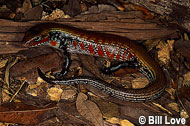Description:
Like most skinks, fire skinks prefer to keep low profiles by hiding under logs and leaves most of the time. Give fire skinks at least 4 inches of soil and tree bark to burrow into. Fire skinks will spend the vast majority of time hidden, except when hungry. After a few weeks in captivity, most fire skins learn to lose their innate fear and come out when their keepers are heard nearby. Insects, snails, spiders and worms make up most of the diet, but some fire skinks also accept pieces of fruit. Feed fire skinks during the day when they are most active. Aim a directional heat lamp at one corner of the cage so there’s a hot spot for the fire skink to sunbathe to reach their preferred temperatures for activity and digestion. Use only a small water bowl that fire skinks may drink from because they may drown in too large a bowl. Spray water on the cage substrate periodically too to keep it from getting bone dry. Fire skinks like humid conditions, but don’t want to be in damp material that may cause infections on the skin. Give fire skinks an enclosure that has at least 36 inches of length in the greatest dimension. One heavy piece of bark serves well as a retreat to shelter under.
Habitat:
Woodlands
Range:
West to central Africa
Scientific Name: Lepidothyris fernandi
Species Group: skink
Family: Scincidae
Size: About one foot long, occasionally larger with complete tails
Level: beginner
Weight:
Dangerous: No



